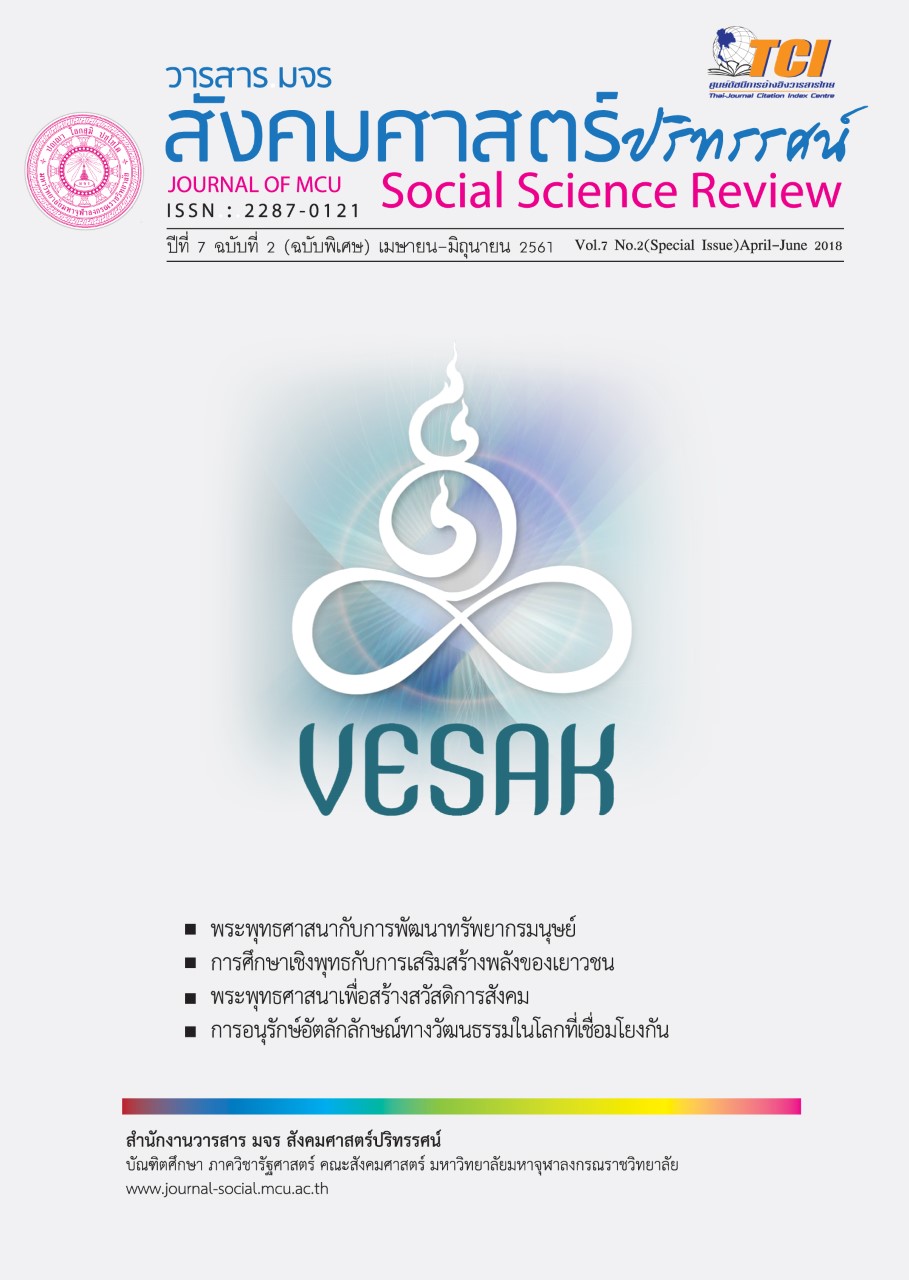SELF-REFLEXIVITY AND ITS PHILOSOPHICAL DIMENSION IN THE TEACHINGS OF AJAHN CHAH
คำสำคัญ:
Thai Forest Tradition, monastic practice, meditation, mindfulness, selfreflexivity, deconstructionบทคัดย่อ
This paper analyzes the philosophical dimension of self-reflexivity as reflected in the teachings and practices of the Thai Forest Tradition monks, especially in the teachings of Ajahn Chah (Phra Bodhinyana Thera). Regular practice of meditation, strict adherence to the vinaya, or monastic disciplinary codes, a highly regimented life-style founded on austerity in living conditions, have made the Forest Tradition monks accomplished meditation masters. Their collected teachings form a corpus of guidelines for the cultivation of mental well-being and
reflexive thinking that have inspired the Buddhist and the non-Buddhist alike, from prison inmates in the West to monastics and lay devotees in Southeast Asia. A mindful deconstruction of dichotomous thought-processes has been rigorously put into practice by almost all the Forest Tradition monks. As for instance, in the teachings of Ajahn Chah it is not just language, but the human Ego in all its kammic dimensions – linguistic, ethico-spiritual, and socio-cultural orientations – get dismantled time and again, as do all dualistic mental states arising from attachment to ‘me’ and ‘mine’, ‘Self’ and the ‘Other’. By consciously defying reification of all mental formations, conditioned states, dichotomous predilections and
conventional signs – be it the written word in its varied embodied textuality, or a concept in its mere conceptuality – the simple, direct, and profound teachings bring to the fore the effectual significance of cultivation of self-reflexivity in daily life.
เอกสารอ้างอิง
Monastery.
Ajahn Sumedho. (1984). Cittaviveka – Teachings from the Silent Mind. Hertfordshire:
Amaravati Publications.
Kornfield, Jack and Breiter, Paul, ed. (1985). A Still Forest Pool – The Insight
Meditation of Achaan Chah. Illinois: The Theosophical Publishing House.
Jaware, Aniket. (2001). Simplifications. New Delhi: Orient Longman Lt.
Magliola, Robert. (1984). Derrida on the Mend. West Lafayette: Purdue University
Press,.
Mahanta, Dipti. (2012). Deconstruction deconstructed: A study of Ajahn Chah in the
light of Derridean philosophy. Research monograph, Bangkok: Buddhist
Research Institute.
Mahasi Sayadaw. (1996). The Great Discourse on Not Self (Anattālakkhana Sutta).
Bangkok: Buddhadhamma Foundation.
Park, Jin Y. ed. (2006). Buddhisms and Deconstructions (New Frameworks for
Continental Philosophy). Rowman & Littlefield Publishers.
______________(2010). Buddhism and Postmodernity: Zen, Huayan, and the
Possibility of Postmodern Ethics. Lexington Books.
Rahula, Walpola. What the Buddha Taught. Bangkok: Haw Trai Foundation, 1990.
Wang, Youru ed. (2007). Deconstruction and the Ethical in Asian Thought. New York:
Routledge
ดาวน์โหลด
เผยแพร่แล้ว
รูปแบบการอ้างอิง
ฉบับ
ประเภทบทความ
สัญญาอนุญาต
ลิขสิทธิ์ (c) 2020 วารสาร มจร สังคมศาสตร์ปริทรรศน์

อนุญาตภายใต้เงื่อนไข Creative Commons Attribution-NonCommercial-NoDerivatives 4.0 International License.
เพื่อให้เป็นไปตามกฎหมายลิขสิทธิ์ ผู้นิพนธ์ทุกท่านต้องลงลายมือชื่อในแบบฟอร์มใบมอบลิขสิทธิ์บทความให้แก่วารสารฯ พร้อมกับบทความต้นฉบับที่ได้แก้ไขครั้งสุดท้าย นอกจากนี้ ผู้นิพนธ์ทุกท่านต้องยืนยันว่าบทความต้นฉบับที่ส่งมาตีพิมพ์นั้น ได้ส่งมาตีพิมพ์เฉพาะในวารสาร มจร สังคมศาสตร์ปริทรรศน์ เพียงแห่งเดียวเท่านั้น หากมีการใช้ภาพหรือตารางหรือเนื้อหาอื่นๆ ของผู้นิพนธ์อื่นที่ปรากฏในสิ่งตีพิมพ์อื่นมาแล้ว ผู้นิพนธ์ต้องขออนุญาตเจ้าของลิขสิทธิ์ก่อน พร้อมทั้งแสดงหนังสือที่ได้รับการยินยอมต่อบรรณาธิการ ก่อนที่บทความจะได้รับการตีพิมพ์ หากไม่เป็นไปตามข้อกำหนดเบื้องต้น ทางวารสารจะถอดบทความของท่านออกโดยไม่มีข้อยกเว้นใดๆ ทั้งสิ้น





